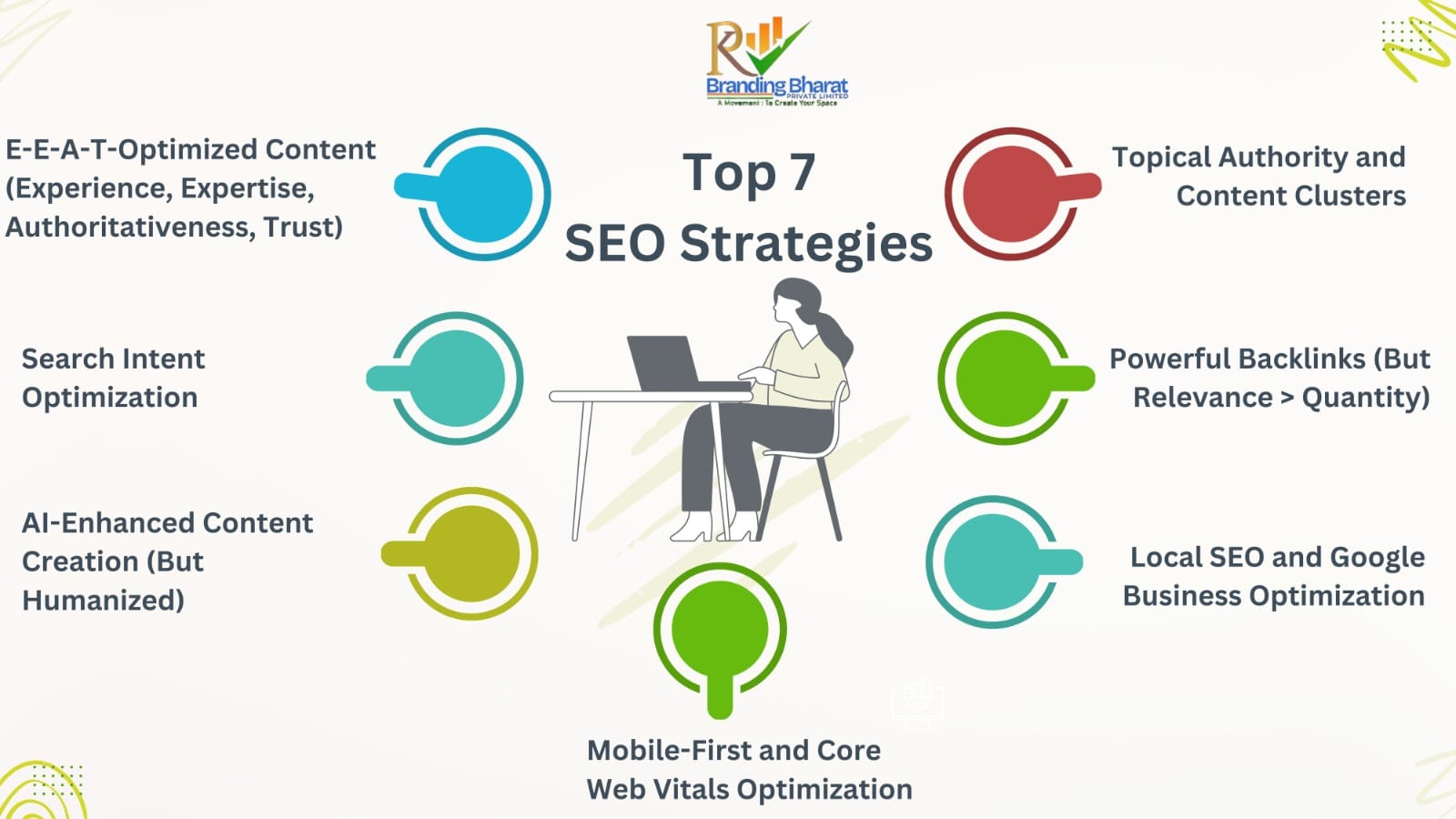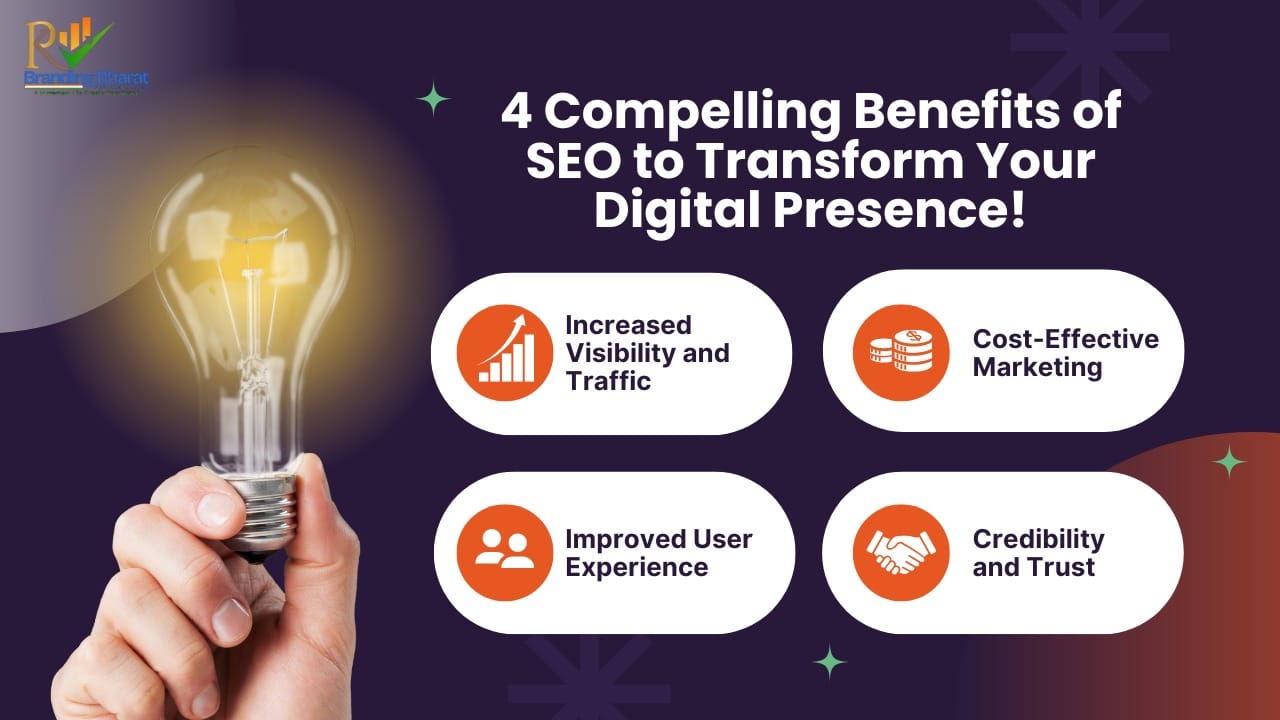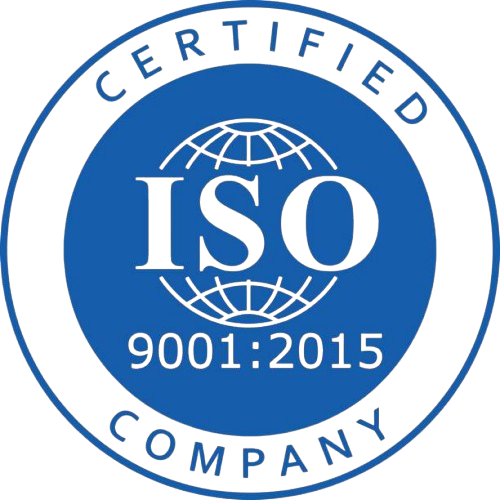SEO isn’t dead—it’s just evolving. In 2025, the rules of search engine optimization have matured, and brands that stay ahead are the ones that adapt. The fundamentals still matter, but the way we apply them is changing fast. Whether you’re a business owner, marketer, or content creator, staying updated with SEO trends can make or break your visibility online.
🚀 Why SEO Still Matters in 2025
Before diving into specific strategies, let’s answer one big question: Is SEO still relevant in 2025? Absolutely. Despite the rise of AI-driven search, voice assistants, and social search, people still turn to Google to find solutions. SEO isn’t about gaming the system anymore — it’s about providing real value to real users. And that’s where these strategies come in.
In this blog, you’ll discover 7 SEO strategies that still work in 2025—along with outdated practices you must avoid. The goal? Help you rank higher, drive organic traffic, and future-proof your SEO efforts.
✅ Top 7 SEO Strategies That Still Work in 2025

1. E-E-A-T-Optimized Content for Trust and Authority
E-E-A-T stands for Experience, Expertise, Authoritativeness, and Trustworthiness. This framework is crucial in 2025, especially after Google’s updates focusing on credible, value-driven content. Want to improve your search visibility? Understanding the importance of E-E-A-T in SEO is key to aligning with Google’s latest ranking systems.
✅ What to do:
- Create content that demonstrates real-life experience or hands-on knowledge.
- Include author bios with credentials.
- Show testimonials, certifications, and client logos.
- Get featured or cited by authoritative sources.
❌ What to avoid:
- Publishing vague or AI-only generated content without human review.
- Hiding author identity or skipping quality signals.
💡Pro Tip: Add “About the Author” sections with credentials and link to social proof (e.g. LinkedIn or interviews). Share real results, case studies, or unique insights to add value and trust.
2. Search Intent Optimization
Google’s Helpful Content System continues to reward websites that satisfy real user intent. AI tools are useful—but they should support, not replace, human expertise.
✅ What to do:
- Understand search intent (informational, transactional, navigational).
- Create content that solves problems, answers questions, or helps users take action.
- Use headings (H1-H3), bullet points, FAQs, and visual aids to improve UX.
❌ What to avoid:
- Keyword stuffing or filler content.
- Writing for bots, not people.
💡Pro Tip: Use Google Search Console and People Also Ask data to refine your content.
3. AI-Enhanced content creation (but Humanized)
Artificial Intelligence has become a game-changer in the world of SEO — and in 2025, it’s not about whether you should use AI tools, but how you use them responsibly.
✅ What to do:
- Use AI tools (like ChatGPT, Jasper, or Gemini) for brainstorming blog topics, generating outlines, and writing initial drafts.
- Optimize content using tools like Surfer SEO, NeuronWriter, or Frase to align with top-performing pages.
- Edit every AI-generated piece for tone, clarity, accuracy, and value.
- Add real-life examples, expert input, and a personal touch to connect with your audience.
❌ What to avoid:
- Publishing AI-written content without human review or editing.
- Over-relying on AI for strategy, tone, or storytelling.
- Creating robotic, keyword-heavy content just to rank — Google can tell.
💡 Pro Tip: Treat AI as your assistant, not your strategist. Combine its power with human creativity to craft content that performs well and genuinely connects with readers.
4. Mobile-First and Core Web Vitals Optimization
User experience is now a ranking signal. Core Web Vitals measure how quickly, responsively, and visually stable your site performs.
✅ What to do:
- Improve LCP (Load Time), CLS (Layout Stability), and FID (Interactivity).
- Use lightweight themes and compress images.
- Ensure mobile-friendliness and HTTPS security.
❌ What to avoid:
- Slow-loading pages, pop-ups, or poor mobile UI.
💡Pro Tip: Use tools like PageSpeed Insights, GTmetrix, or 10Web Booster for easy improvements.
5. Topical Authority Through Content Clusters
Internal linking improves SEO by distributing link equity and helping users navigate better. It’s still a powerful but underused strategy.
✅ What to do:
- Link related blog posts using descriptive anchor text.
- Create topic clusters and pillar pages.
- Use breadcrumbs and a clean URL structure.
❌ What to avoid:
- Orphan pages with no internal links.
- Using “click here” as anchor text.
💡Pro Tip: Every time you publish a new blog post, link to 2–3 older relevant posts.
6. Build Quality Backlinks Over Quantity
Backlinks remain one of the strongest ranking signals, but Google now focuses more on quality and relevance than just volume.
✅ What to do:
- Get backlinks from reputable, niche-related websites.
- Use digital PR, guest blogging, HARO, or expert roundups.
- Earn links by publishing original research or unique insights.
❌ What to avoid:
- Buying links or spamming with low-quality directories.
- Relying on PBNs (Private Blog Networks).
💡Pro Tip: Build link-worthy assets like infographics, stats, case studies, or free tools.
7. Local SEO and Google Business Optimization
For service-based and brick-and-mortar businesses, Local SEO is more important than ever. A well-optimized Google Business Profile (GBP) can drive foot traffic, calls, and local searches.
✅ What to do:
- Keep your GBP updated with keywords, photos, offers, and Q&A.
- Encourage and respond to reviews.
- Use local citations (NAP consistency).
❌ What to avoid:
- Inconsistent business info across platforms.
- Ignoring user questions or negative reviews.
💡Pro Tip: Post regularly on your GBP to boost visibility and engagement.
❌ SEO Practices to Avoid in 2025
These outdated strategies could hurt your rankings:
1. Keyword Stuffing
Cramming the same keywords repeatedly is not only unnatural but triggers Google penalties.
2. Spammy Backlinks
Avoid link farms, comment spam, or irrelevant directory listings.
3. Thin Content
Pages with little to no value — like 200-word blog posts — are a waste of crawl budget.
4. Ignoring User Experience
If your site is slow, cluttered, or hard to navigate, users (and Google) won’t stick around.
5. Duplicate or AI-Only Content
Copy-pasting or publishing raw AI-generated content without editing can lead to poor rankings and trust issues.
📊 Bonus Tips for Better SEO in 2025

✅ Use Schema Markup
Helps search engines understand your content and improve CTR with rich snippets.
✅ Prioritize Voice Search
Use conversational language and long-tail keywords.
✅ Focus on Local SEO (Even as a National Brand)
Many users include phrases like “near me” or city names in their search.
✅ Improve Dwell Time and Reduce Bounce Rate
Hook readers early and keep them engaged with relevant visuals, videos, and easy navigation.
✨ Final Thoughts
SEO in 2025 is less about technical hacks and more about delivering real value. If you focus on intent, quality, experience, and trust — you’re already ahead of most competitors. It’s not about chasing algorithms anymore; it’s about building authority and relationships online. If you’re still relying on outdated SEO tricks, now’s the time to pivot.
At KPR Branding Bharat, we help businesses grow with smart, white-hat SEO strategies tailored to today’s algorithms and user behaviors.
📈 Ready to grow your organic traffic?
🧩 Need help with your SEO strategy? Whether you’re a startup or an established brand, KPR Branding Bharat is here to help you grow.
👉 Let’s connect and build something great!
🔗 Follow Us for the Latest in Digital Marketing:
💬 Let’s Chat:
Which strategy do you think is most important in 2025? Drop a comment or send us a message — we’d love to hear from you!
FAQs
Q1. What is the most important SEO strategy in 2025?
A: Focus on E-E-A-T and helpful content. These directly impact your credibility and visibility.
Q2. Does AI help with SEO content creation?
A: Yes, but it should support—not replace—human experience and editing.
Q3. Are backlinks still important in 2025?
A: Yes! But quality, relevance, and natural acquisition matter more than sheer quantity.
Want more SEO tips? Follow KPR Branding Bharat for fresh content, updates, and digital growth strategies.
👩💼 About the Author
Banita Aggarwal is an SEO Executive at KPR Branding Bharat, helping brands grow their online presence with smart, ethical SEO strategies. She’s passionate about content, rankings, and all things digital marketing.
📩 Want to boost your SEO? Connect with our team.









